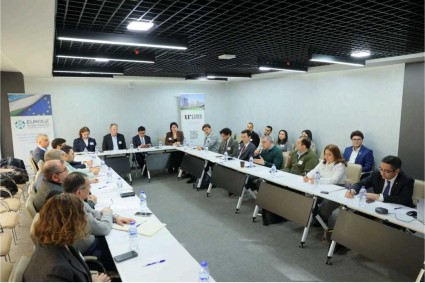The Launch Ceremony of the Innovation Group focused on the adaptation of the livestock industry to climate change and the integration of modern technologies in dairy production.
This initiative has been established and funded within the framework of a joint project between the UNDP and the Ministry of Agriculture, funded by the European Union "Supporting an inclusive transition to a green economy in the Agri-food sector and development of a climate-smart Uzbek Agriculture Knowledge and Innovation System" (EU-AGRIN).
The Innovation Group launch ceremony was graced by the presence of distinguished guests, including Zoir Mirzayev, the Governor of Tashkent region, Zulayho Mahkamova, the Deputy Prime Minister, Alisher Shukurov, the Deputy Minister of Agriculture, Wim Riepma, the Head of Cooperation of the EU Delegation to Uzbekistan, Anas Fayyad Qarman, the UNDP Resident Representative a.i. in Uzbekistan, the Association of Agrarian Women, and members of the local community.
Throughout the ceremony in their warm welcome addresses, the speakers underscored the important role of the livestock sector in the global food system, emphasizing its contribution to poverty alleviation and nutrition. Notably, dairy production emerges as a significant source of employment opportunities for rural households. The speakers also highlighted the challenges of the livestock sector faces, in particular, due to climate change.
Wim Riepma, the Head of Cooperation of the EU Delegation to Uzbekistan, emphasized the need for innovation groups, stating, "The impacts of climate change on current livestock systems, and the contribution of the livestock sector itself to global warming, are of major concern. We need innovative solutions to reduce greenhouse gas emissions, to manage scarce water resources, to prevent and reverse environmental and land degradation, to control animal diseases, to ensure that food is safe, and to tackle the growing problem of anti-microbial resistance. This brings along commercial opportunities along the value chain, from livestock keeping to processing, storage, transport and retailing of livestock products, and as we witness today, women do play a key role in finding and realizing innovative solutions. We are therefore proud to support the EU-AGRIN project that clearly brings very concrete benefits to the people of Uzbekistan."
Anas Fayyad Qarman, UNDP Resident Representative a.i. in Uzbekistan, noted in his statement, "According to the UN data, livestock plays an integral role in global food systems and poverty reduction, supporting the livelihoods of nearly 1.3 billion people, especially in developing nations experiencing rapid urbanization and income growth. Livestock accounts for 40% of the global agricultural production value, with dairy production being a significant source of employment and income for rural population. However, it is essential to acknowledge that livestock production also contributes to greenhouse gas emissions, accounting for an estimated 14.5% of global anthropogenic emissions. Thus, balancing increased livestock production with climate change mitigation is a formidable challenge. It necessitates a comprehensive understanding of the impacts of climate change on livestock and the potential for adaptation and mitigation strategies. In this regard, the Innovation Groups will work closely with farmers and households to employ innovative approaches aimed at achieving climate change mitigation and facilitating a 'green' transformational recovery pathways."
The Innovation Group dedicated to adapting the Livestock Industry to Climate Change and incorporating modern technologies in dairy product production will be led by the Association of Agrarian Women of Uzbekistan. They will closely collaborate with the Scientific Research Institute of Livestock and Poultry, Tashkent State Agrarian University, Zangiata Agrotechnological Vocational College, Agricultural Services Center (AKIS), and local farms and households in the Tashkent region.
This Innovation Group will introduce a range of innovations in dairy farming, including the effective utilization of available fodder through the use of the "mini-mixer," the testing of a new type of fodder, the installation of a modern cooling canopy to mitigate the impacts of climate change on livestock, the implementation of a specialized method for early disease detection in cows, efficient management of livestock waste to reduce negative environmental impacts, the production of a new type of compost, and the establishment of home-based milk processing facilities equipped with modern equipment.
Laboratory and farm equipment, generously provided by the EU-funded EU-AGRIN project, such as vertical tank milk cooler, ultrasonic milk analyzers, butter-making machines, milk separators, aluminum milk containers, cheese molds, vacuum packing machines, dip for disinfecting udder teats before and after milking, mobile milking machines, rubber mattresses for dairy farming, production tables with bottom shelves, mastitis detectors for cows, industrial refrigerators, and other essential laboratory equipment, have been successfully installed in five households in the Ohangaron district, carefully chosen by the Innovation Group.















